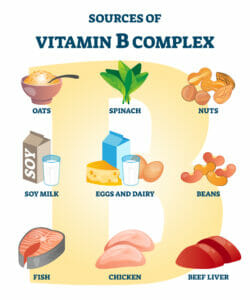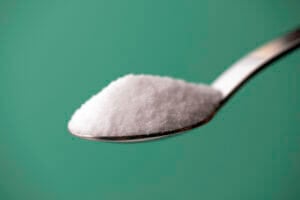How to Choose the Best Multivitamin for Women

In addition to age and pregnancy, various lifestyle and dietary differences can also alter your nutritional requirements and your doctor may recommend supplements to compensate for what you aren’t getting through diet.
While the best multivitamin for women may depend on the individual, as a general guide, the following vitamins and minerals should be included.
Table of Contents
What Ingredients should be in the Best Multivitamin for Women?
Iron
Iron is considered an essential mineral for the body due to its role in making red blood cells, which help with oxygen transfer from the lungs to other tissues in the body. Iron also plays a role in neurological function and the making of some hormones, among other vital roles. Due to blood lost during menstruation, women between the ages of 19-50 years old have an RDA of 18mg of iron a day. The RDA goes up to 27mg of iron during pregnancy and down to 10mg during lactation. (1) As with many nutrients, a deficiency of iron can cause or contribute to health problems, mainly iron deficiency anemia—which can cause fatigue. In addition, an excess of iron (25mg) can cause stomach upset, especially if not taken with food, and an intake over 60mg can cause severe effects, including organ failure.
Iodine
Iodine is a critical mineral due to its role in thyroid function—it is essential in the making of hormones that regulate metabolism and is essential for proper brain development in utero and in infancy. Teenagers and adult women have an RDA of 150mg, increasing during pregnancy to 220mg, and increasing further to 290mg during breastfeeding. (2) An iodine deficiency can lead to a cessation of ovulation and is especially dangerous during pregnancy, as a deficiency can raise blood pressure in the mother and cause developmental changes in the fetal brain, as well as alter cognitive function later in childhood. An excess of iodine, above 1,100mg in adults can cause complications, including nausea and even coma.
Vitamin D and Calcium
Vitamin D and calcium are often paired in supplements because vitamin D helps with the absorption of calcium—both are considered essential for bone health. Since vitamin D is synthesised by the skin, if you avoid the sun, or wear sunscreen, you may be at risk of a vitamin D deficiency. An adequate intake of calcium throughout all stages of life is considered crucial as it is the building block of bones—providing both structure and strength. (3) These two nutrients are even more important in post-menopausal women, as bone fractures are more likely to occur in older women. A vitamin D intake of between 500-800IU and 1,200mg of calcium is often recommended. (4)
B Vitamins

B1— Thiamin helps break down glucose into energy and while deficiencies in a western diet are not common, consumption of alcohol and a poor diet are risk factors. The RDA is 1.1 mg.
B2— Riboflavin is involved in energy production and also plays a role in vision and skin health. Again, deficiencies are uncommon but consuming alcohol and avoiding dairy products are risk factors.
B3— Niacin is essential for breaking carbohydrates into energy and its role in supporting both the nervous and digestive systems. Excessive alcohol intake is the primary cause of deficiency.
B5— Pantothenic acid helps metabolise carbohydrates, including alcohol and a deficiency is incredibly rare due to the wide variety of foods it is found in. An RDA has not been established.
B6— B6 metabolises proteins and carbohydrates as well as its role in the immune system and hormone activity. Women are particularly at risk of a B6 deficiency, especially if they are on contraceptive pills, as are the elderly. The RDA is 1.3 mg
B9— Folate (called folic acid in supplements and fortified foods) is used to form red blood cells, which carry oxygen to cells and is essential for the fetal nervous system. Women who want to become pregnant need to be sure they are getting enough of this vital nutrient, at least 400 mg, to lower the risk of birth defects, including spinal bifida.
B12— B12 is used to maintain the myelin around nerve cells, form red blood cells, and break down fatty and amino acids. It is only found in animal sources so women who follow a strict vegan diet are at a severe risk of being deficient. In addition, B-12 absorption decreases with age so older women are also at risk of a deficiency. The RDA of B-12 is 2.4 micrograms.
Collagen
While not a strict essential in a multivitamin for women, collagen supplements may improve both the texture and elasticity of skin as it ages. In a double blind placebo controlled study, there was noticeable improvement in both the look and feel of skin in people who took a daily collagen supplement. The improvement was noted by both the researchers and the subjects and an increase in joint mobility was also noted in 39% of the participants. (7)
Best Multivitamin for women at different life stages
Depending on what life stage you are in, your nutritional needs will vary.
Pregnant women, and those who are planning on becoming pregnant need to be sure that they have a sufficient intake of vitamins B6, B9, iron, iodine due to their roles in fetal development.
Post-menopausal women need to be mindful of their vitamin D and calcium levels for bone health and may want to consider collagen as well.
For the elderly, the uptake of most vitamins is not as efficient, especially vitamin B-12. Due to this fact, nutritionists often advise B-12 supplements for women over 50. (6) Since it is also common for older people to eat less, and a less diverse diet, they may be at extra risk of a multitude of deficiencies.
Lifestyle differences that alter what may be the best multivitamin for women
In addition to the changing nutritional needs of pregnant and lactating women, different lifestyle choices affect your RDA.
Women who smoke are advised to increase their vitamin C intake, since smoking results in lower blood serum levels of vitamin C. The general advice is 35mg a day more than women who don’t smoke. (7)
Alcohol consumption affects many of the B complex vitamins’ intake levels so women that drink often or heavily may want to consider supplementation.
Your diet may change your supplement needs. If you follow a vegan diet you may need to pay extra attention to B-12 and calcium supplementation. If you follow any kind of restrictive diet, you may be eliminating crucial vitamins and minerals and you may want to consider supplementation.
While diet alone may meet some of your nutrient needs, if you are pregnant, breastfeeding, menopausal, or have other lifestyle factors that affect your nutrition, you may want to consider a multivitamin.
Thank you for taking the time to read How to Choose the Best Multivitamin for Women
Please note: All information presented to you in this website is intended for your general knowledge only and is not a substitute for medical advice or treatment for specific medical conditions. We cannot, and will not give you medical advice. We strongly recommend you consult your physician for any and all specific health issues. If you have any questions or contributions, please contact us via email or phone-call. We are constantly looking for new information to promote wellness – and hearing from you would make our day.
Live Vibrantly!
References
1) Iron – Health Professional Fact Sheet
2) Iodine
3) Calcium Intake in Bone Health
4) Vitamin D and bone health in postmenopausal women
5) Vitamin B
6) Vitamin B-12



